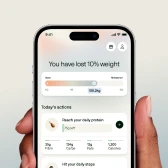If you’re doing the same exercises or diet plan as your friends or colleagues and aren’t seeing the results you’d want, you might be wondering: “why can’t I lose weight?”. Take a step back and think about what might be different for you—sometimes, the answer is stress.
The way stress impacts the body and metabolism is complicated as we all react differently to it. The occasional stressful day might not have much of an impact on your weight, but prolonged periods of stress can cause poor sleep, poor mental health, and even physical symptoms like headaches. All of these can have an impact on our appetite, and ability to lose or put on weight.
While some people may lose weight due to feeling anxious and unable to eat, for others, stress can make them want to eat more. Recognising how stress affects you can help you manage your diet and sleep pattern when things get hectic. If you’re aware of your stress triggers, and how you react to them, you’re more likely to try and keep things in balance.
Understanding the relationship between stress and weight
Picture this: you’ve had a nightmare day at work, nothing’s gone right, and your journey home is full of delays. Being on high alert leaves you hungry and tired. When you get home—later than you’d like—you just want to eat something convenient and comforting. So, you opt for a greasy takeaway or not-so-nutritious microwave meal and head straight to bed afterwards. Instead of sleeping, you end up scrolling on your phone until the early hours, unable to drift off.
We all have days like this once in a while, and there’s nothing wrong with the occasional takeaway treat. If you experience a day like this every so often, it could be an example of acute stress.
Acute stress is short-term stress typically caused by immediate stressors or challenging situations. Your body's fight-or-flight response might cause you to have a temporarily increased heart rate and rush of adrenaline. Acute stress is not always bad—it’s what we experience before an exam, presentation, or big event, and it can allow us to perform at our best
But if this becomes your routine most days, it could become chronic stress. Chronic stress means these stressors persist over an extended period. This prolonged exposure can increase the risk of health problems such as cardiovascular disease, anxiety, and depression.
Suffering from the physical and mental impacts of chronic stress can slow down your weight loss goals.
Cortisol and weight loss
When stress points our body into fight-or-flight mode, this triggers our sympathetic nervous system to release adrenaline. Adrenaline can be helpful in small amounts as it gives us a surge of energy, instinctively making us keep out of harm’s way. But if you’re in fight-or-flight mode most of the time, it does more harm than good. A sustained production of adrenaline signals the brain to release a hormone called cortisol, which might make it harder to lose weight.
How stress affects your body?
Three key things stress can wreak havoc with when it comes to trying to lose or gain weight are:
Appetite
Chronic stress can result in an increased appetite and cravings for unhealthy foods, as well as reducing motivation for physical activity. This is likely due to increased hunger hormones. Using emotional eating as a coping mechanism in response to negative emotions is a common cause of weight gain during stressful periods.
On the flip side, emotional undereating (or restricted eating) is also a stress response—most often to acute stress. However some research suggests it’s more common in young children than adults, and it’s more likely to happen to adults who are already underweight.
One study suggested that chronic stress could lead to a fast-food addiction over time, making it harder to resist cravings. It notes how the reward system in our brain, which normally helps us feel motivated, can become more sensitive to these foods, making us want to eat more of them even if we’re not hungry.
Overall, the researchers found that roughly 40% of people experience an appetite increase when stressed, 40% experience a decrease, while around 20% experience no change.
Sleep
Some people find it harder to sleep when stressed than others. This can be linked to various mental and physical health issues like insomnia, depression and anxiety, as lack of sleep can cause a poorly regulated nervous system, decreased brain function, and hormonal imbalances.
There is an established connection between sleep quality or lack of sleep and appetite regulation. Research suggests lack of sleep could make our brains more sensitive to food-related rewards—like the quick fix of fast food.
When you feel unwell and tired, you’re less likely to stick to a regular exercise routine. So getting enough sleep is just as important as eating fewer calories and being more active if you’re trying to lose weight.
Blood sugar
Stress and cortisol release can also spike our blood sugar levels. When cortisol rises, less insulin is produced, meaning that it can’t work as well to convert sugar (glucose) into energy. Also, more glucose is produced by the liver (in a process called gluconeogenesis) in response to cortisol. This results in more sugar remaining in the bloodstream, creating an imbalance.
If you’re experiencing chronic stress, a prolonged spike in blood sugar levels can also result in a higher risk of developing type 2 diabetes.
Practical tips for managing stress during your weight loss journey
Because stress can mess with our appetite and sleep quality, it can also make us irritable, antisocial, and overwhelmed. By now we all know the recommended advice for combatting these feelings: eating well, exercising, mindful breathing, and talking about it. However, this is often easier said than done.
Setting small targets that you can easily achieve will help you stay consistent and maintain your weight loss motivation.
Mindfulness and breathing techniques
Mindfulness is a meditation technique focusing on what's happening in the present moment and accepting it for what it is. It aims to help you improve self-awareness and cope better with difficult thoughts and feelings.
Pairing mindfulness with a breathing exercise can help to calm your nervous system. The NHS recommends regularly following this simple breathing exercise for at least five minutes to combat stress:
- Sit or lie down comfortably
- Let your breath flow deep into your belly as is comfortable, without forcing it.
- Breathe in through your nose and out through your mouth.
- Breathe in gently and regularly. Try counting steadily from 1 to 5. You may not be able to reach 5 at first.
- Then let your breath flow out gently, counting from 1 to 5 again if you find this helpful.
Eating well and exercising
Eating well and exercising is crucial for maintaining a healthy weight. After a stressful day, going for a run or hitting the gym might not be at the top of your ‘ways to wind down’ list. However, exercising can actually reduce cortisol and adrenaline by releasing feel-good hormones like endorphins.
Similarly, some research suggests that certain foods containing polyunsaturated fats, omega-3 and vegetables may help to regulate cortisol levels—think oily fish and fewer salty foods. Plus, eating regular healthy meals can reduce the chances of overeating, or opting for calorie-dense but nutrient-poor foods. Furthermore, eating a nutrient-rich diet will keep your immune system in good shape, meaning you’ll be in a better state to handle stress.
If you’re using one of Voy’s weight loss treatments like Wegovy or Mounjaro , you’ll already have a personalised weight loss plan in place, so try to keep consistent and push through even when you’re feeling low on energy.
Seek support from your GP
Ultimately, if you’re still struggling, there’s no shame in seeking help from your GP if you’re feeling like stress is getting on top of you. Your doctor may be able to recommend different treatments including talking therapies, or medication.
Stress isn’t necessarily something we can prevent, but we can try to manage its effects on our bodies and minds by not focusing on the things we can’t change. And instead, putting our time and energy into finding small ways to feel better each day.
If you’ve been trying to lose weight through diet and exercise but aren’t seeing the results you hoped, there could be a medical treatment option that could help kickstart your weight loss journey. Take Voy’s weight loss quiz to find out if you’re eligible for some of the newest weight management medications. It’ll only take a few minutes.
“Breathing Exercises for Stress.” NHS. 
Chaput, JP., Tremblay, A. Insufficient Sleep as a Contributor to Weight Gain: An Update. Curr Obes Rep 1
Chu B, Marwaha K, Sanvictores T, et al. “Physiology, Stress Reaction.” In: StatPearls [Internet]
Dakanalis, Antonios et al. “The Association of Emotional Eating with Overweight/Obesity, Depression, Anxiety/Stress, and Dietary Patterns: A Review of the Current Clinical Evidence.” Nutrients
“Exercising to Relax.” Harvard Health
Geiker, N. R. W., et al. “Does Stress Influence Sleep Patterns, Food Intake, Weight Gain, Abdominal Obesity and Weight Loss Interventions and Vice Versa?” Obesity Reviews
“Get Help with Stress.” NHS.
Kalmbach, David A et al. “The Impact of Stress on Sleep: Pathogenic Sleep Reactivity as a Vulnerability to Insomnia and Circadian Disorders.” Journal of Sleep Research
Lauren Janson. “Emotional Undereating.” Exchanges, UNC Center of Excellence for Eating Disorders,
Sharma K, Akre S, Chakole S, et al. (September 13, 2022) “Stress-Induced Diabetes: A Review.” Cureus
Soltani, Hoda, et al. “Diet Quality for Sodium and Vegetables Mediate Effects of Whole Food Diets on 8-Week Changes in Stress Load.” Nutrients
“Stress and Health.” Harvard School of Public Health
“Talking to Your GP.” Mind
Thau L, Gandhi J, Sharma S. Physiology, Cortisol. In: StatPearls [Internet]. Treasure Island (FL): StatPearls Publishing; 2025 Jan. Available from: www.ncbi.nlm.nih.gov/books/NBK538239.
“Types of Complementary and Alternative Therapies.” Mind.org.uk, 2022, www.mind.org.uk/information-support/drugs-and-treatments/complementary-and-alternative-therapies/types-of-complementary-and-alternative-therapies/#Mindfulness. Accessed 19 Jan. 2025.
Yau, Y H C, and M N Potenza. “Stress and Eating Behaviors.” Minerva Endocrinologica











